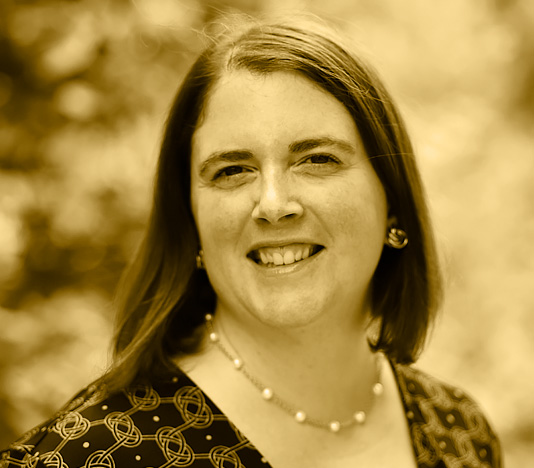“Nationally, 80% of K-12 teachers are women, while less than a third of superintendents are women. … For me, it’s hard to overstate how problematic that situation is.”
Sarah Odell

In the spring of 2020, as the spread of COVID-19 forced schools around the globe to shut their doors, Sarah Odell ’06 noticed a pattern. Teachers, most of whom are women, were being disproportionately affected by the pandemic.
As a former high-school English teacher currently pursuing a doctorate in education at the University of Wisconsin-Madison, Odell has many friends who are teachers. She saw firsthand how they were taking on extra emotional labor at work and at home — from meeting one-on-one with students to checking in with colleagues and supervising remote learning for their own children — and wanted to get people talking about how to support them.
Odell decided to organize Feminist Fireside Chats, hosted by UW’s Professional Learning and Community Education program, or PLACE, where she is a coordinator. Open to the public, the online series featured a different female leader each month talking with Odell and her colleagues and answering attendees’ questions about topics related to women in education in the time of COVID-19, as well as the mass protest movement against racial injustice sweeping the nation. Featured speakers included Paula Johnson, the first Black president of Odell’s alma mater, Wellesley College; and Meredith Hitchcock ’06, a former Google employee who left the company to use her tech skills on behalf of criminal justice reform.
In addition to providing a safe space for productive conversation, the Feminist Fireside Chats aimed to raise awareness around PLACE’s new Women’s Leadership Incubator, scheduled for launch in 2021. “Nationally, 80% of K-12 teachers are women, while less than a third of superintendents are women,” Odell points out. “The numbers are roughly the same for heads of independent schools. For me, it’s hard to overstate how problematic that situation is.”
Odell remembers “coming into an awareness about gender” during her four years as a student and athlete at Exeter; she was co-captain of varsity squash, co-head of the ski club and rowed crew. “There were definitely dynamics that played out at the Harkness table which, as an adult, I think I’m more aware of than I was at the time,” she says. During her senior spring, Odell participated in the Washington Intern Program, becoming the first Exonian to intern in the office of Senator Hillary Rodham Clinton of New York.
At Wellesley, Odell was blown away when she first walked into the historic room where the Senate members at the all-women’s college met. “The Senate was about 100 students, plus the cabinet, and it was all women,” Odell says. “That was who ran college government. … It’s hard to explain to people who haven’t been in that single-sex environment what the experience is like and what it does to shape your worldview.”
After graduating from Wellesley in 2010, Odell worked in publishing at HarperCollins and taught English at the Hill School in Pottstown, Pennsylvania, and later at Miss Porter’s School, an all-girls institution in Farmington, Connecticut.
Odell’s experience at Wellesley and Miss Porter’s solidified her belief in the value of single-sex education. “It’s almost like in a coed environment the gender definitions become more rigid because students are behaving in opposition to something else,” she says. “Maybe it’s counterintuitive, but in a single-sex environment there’s more expression of what it means to be female.”
After earning her master’s degree in education (with a focus on school leadership) at the University of Pennsylvania, Odell chose to pursue her doctorate at UW-Madison, in part because the university encouraged doctoral students to do a minor outside their department. Though she had considered herself pretty progressive, an intro course in her gender and women’s studies minor upended her existing notions of both gender and leadership.
“I became much more comfortable with the idea of questioning assumptions we make about people based on their gender identity,” Odell says. Assumptions like, “Women make great school leaders because they are mothers,” or “Women make great leaders because they tend to be more relational.” While these things may be true in some cases, Odell says, “We need to stop talking about either gender as though they all behave in some way.”
Odell hopes that when the Women’s Leadership Incubator launches in 2021, it can “be a disrupter in the education leadership space,” in part, by encouraging more expansive conversations about what it means to be a good leader. Her goal: a 90% success rate in 10 years. For Odell, that means 90% of women who go through the incubator program would move into a school leadership position within two years after graduation. With the Fireside Chats, Odell and her colleagues are laying the groundwork for that goal by providing a space where women can support each other through the current crises — and beyond.